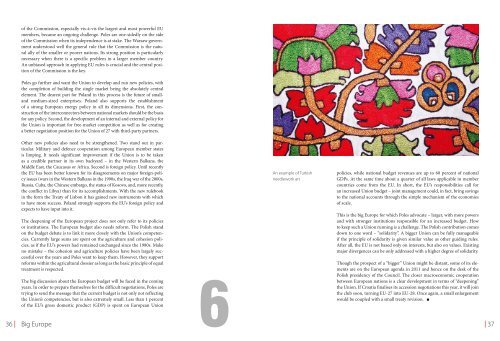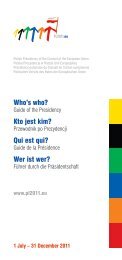„The Brighter Side of Europe” / Piotr Kaczyński
„The Brighter Side of Europe” / Piotr Kaczyński
„The Brighter Side of Europe” / Piotr Kaczyński
Create successful ePaper yourself
Turn your PDF publications into a flip-book with our unique Google optimized e-Paper software.
<strong>of</strong> the Commission, especially vis-à-vis the largest and most powerful EU<br />
members, became an ongoing challenge. Poles are one-sidedly on the side<br />
<strong>of</strong> the Commission when its independence is at stake. The Warsaw government<br />
understood well the general rule that the Commission is the natural<br />
ally <strong>of</strong> the smaller or poorer nations. Its strong position is particularly<br />
necessary when there is a specific problem in a larger member country.<br />
An unbiased approach in applying EU rules is crucial and the central position<br />
<strong>of</strong> the Commission is the key.<br />
Poles go further and want the Union to develop and run new policies, with<br />
the completion <strong>of</strong> building the single market being the absolutely central<br />
element. The dearest part for Poland in this process is the future <strong>of</strong> small-<br />
and medium-sized enterprises. Poland also supports the establishment<br />
<strong>of</strong> a strong European energy policy in all its dimensions. First, the con-<br />
struction <strong>of</strong> the interconnectors between national markets should be the basis<br />
for any policy. Second, the development <strong>of</strong> an internal and external policy for<br />
the Union is important for free-market competition as well as for creating<br />
a better negotiation position for the Union <strong>of</strong> 27 with third-party partners.<br />
Other new policies also need to be strengthened. Two stand out in particular.<br />
Military and defence cooperation among European member states<br />
is limping. It needs significant improvement if the Union is to be taken<br />
as a credible partner in its own backyard – in the Western Balkans, the<br />
Middle East, the Caucasus or Africa. Second is foreign policy. Until recently<br />
the EU has been better known for its disagreements on major foreign-poli-<br />
cy issues (wars in the Western Balkans in the 1990s, the Iraq war <strong>of</strong> the 2000s,<br />
Russia, Cuba, the Chinese embargo, the status <strong>of</strong> Kosovo, and, more recently,<br />
the conflict in Libya) than for its accomplishments. With the new rulebook<br />
in the form the Treaty <strong>of</strong> Lisbon it has gained new instruments with which<br />
to have more success. Poland strongly supports the EU’s foreign policy and<br />
expects to have input into it.<br />
The deepening <strong>of</strong> the European project does not only refer to its policies<br />
or institutions. The European budget also needs reform. The Polish stand<br />
on the budget debate is to link it more closely with the Union’s competencies.<br />
Currently large sums are spent on the agriculture and cohesion policies,<br />
as if the EU’s powers had remained unchanged since the 1980s. Make<br />
no mistake – the cohesion and agriculture policies have been largely successful<br />
over the years and Poles want to keep them. However, they support<br />
reforms within the agricultural dossier as long as the basic principle <strong>of</strong> equal<br />
treatment is respected.<br />
The big discussion about the European budget will be faced in the coming<br />
years. In order to prepare themselves for the difficult negotiations, Poles are<br />
trying to send the message that the current budget is not only not reflecting<br />
the Union’s competencies, but is also extremely small. Less than 1 percent<br />
<strong>of</strong> the EU’s gross domestic product (GDP) is spent on European Union<br />
6<br />
An example <strong>of</strong> Turkish<br />
needlework art<br />
policies, while national budget revenues are up to 60 percent <strong>of</strong> national<br />
GDPs. At the same time about a quarter <strong>of</strong> all laws applicable in member<br />
countries come from the EU. In short, the EU’s responsibilities call for<br />
an increased Union budget – joint management could, in fact, bring savings<br />
to the national accounts through the simple mechanism <strong>of</strong> the economies<br />
<strong>of</strong> scale.<br />
This is the big Europe for which Poles advocate – larger, with more powers<br />
and with stronger institutions responsible for an increased budget. How<br />
to keep such a Union running is a challenge. The Polish contribution comes<br />
down to one word – “solidarity”. A bigger Union can be fully manageable<br />
if the principle <strong>of</strong> solidarity is given similar value as other guiding rules.<br />
After all, the EU is not based only on interests, but also on values. Existing<br />
major divergences can be only addressed with a higher degree <strong>of</strong> solidarity.<br />
Though the prospect <strong>of</strong> a “bigger” Union might be distant, some <strong>of</strong> its elements<br />
are on the European agenda in 2011 and hence on the desk <strong>of</strong> the<br />
Polish presidency <strong>of</strong> the Council. The closer macroeconomic cooperation<br />
between European nations is a clear development in terms <strong>of</strong> “deepening”<br />
the Union. If Croatia finalises its accession negotiations this year, it will join<br />
the club soon, turning EU-27 into EU-28. Once again, a small enlargement<br />
would be coupled with a small treaty revision.<br />
36 | Big Europe<br />
| 37



